10 Things I’ve Learned, a new and hopefully amusing series of lists for the ol’ blog. Welcome to it. If you’re not into lists because Buzzfeed and its bajillion clones have put you off with all their force-loading noisy ads, data-hogging auto-refresh-redirect-pop-ups and having to click through a thousand slow-as-molasses-in-January images that are never as funny as the click-bait headline indictated… well, this is the list for you! I don’t have ads (as of this writing) and I dump all my brain-vomit onto the same page for easy perusing!
I’m here to serve you, right?
Anyway…
I have had a bunch of thoughts lately about things I’ve learned by doing/watching/reading/seeing various things/people/events and what better way to fill-in the days between installments of Rhiallis’ journey than with random silly lists? Spoiler Alert – there is no better way!
This time on 10-TIL: 10 Things I’ve Learned About Relationships By Watching K-Dramas.
As many of you know, I’ve been watching a lot of K-Dramas the past few months. It all began with a curious click on Netflix, which sent me careening into the wonderfully weird world of Lee Gun and Kim Mi-Young (gosh, I hope I got those right – it has been awhile) in “Fated To Love You”.
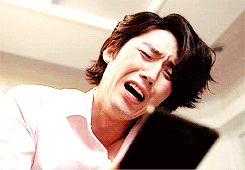
I laughed, I cried, I fell in love over and over. Lee Gun was so absurdly over the top (even by K-Drama standards) and Mi-Young was so sweet. Their whole situation was so silly and yet endearing. Dog Poopie lives on, man.
From there, I soaked up a half-dozen series on Netflix and Hulu. I tried to rent several on DvD at a local Korean grocery, but alas, they were not subtitled so they’d have done me little good.
Now I’m a loyal subscriber at DramaFever where I have made my way through a score of Asian Dramas (primarily Korean, though). Recently I endured “Who Are You: School 2015” (which I didn’t love, but did enjoy) and sort of hated myself for loving “Birth of a Beauty” so much. I love Lee Min Ho and Park Shin Hye, so I liked “Heirs” and I’ve even caught both Korean & Japanese versions of “Playful Kiss” (Korean version won out) and the Taiwanese version of “Fated to Love You” (Korean won again).
In all these hours of K-Dramas, I feel like I’ve learned a lot about relationships, so I’m here to lay some knowledge down on you. Hope you’re buckled in, ‘cuz it is about to get real up in here.
(Editor’s Note: No… just no, Josie. You can’t pull it off. Stop trying.)
- Communication is KEY!
- Selfless sacrifice is bullshit.
- The meaner he is, the deeper his love.
- Short Hair = Boy. And it is okay to have a vague crush on him.
- Hot, rich guys ALWAYS show up to rescue poor frumpy and/or awkward girls, who end up saving them from themselves.
- Stalking is Love.
- It’s a Small World
- Guys cry too.
- Sex is not the only intimacy to be shared.
- Consent is important.
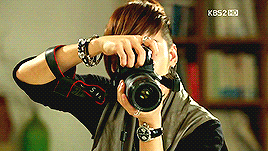
I’m starting off 100% serious and sincere. You must communicate to have a successful relationship. The characters in these K-Dramas do not understand this concept and thus, the unending series of misunderstandings and absurdities begins… every. single. time.
If Suh In Ha had just told his buddy Dong Wook that he was madly crushing on Yoon Hee… he would not have married a shrew, divorced the bitch who refused to let him see his son who grew to resent him, and wasted 30 years of his life pining for his One True Love™ who may or may not be dead.
If Go Mi-Nyu had told the A.N.Jell boys that she was covering for her twin brother, Go Mi-Nam, they wouldn’t have all had raging confusion boners for her/him and ended up questioning their own sexuality due to all that weird attraction.
It goes on and on. Fully 99% of K-Drama plotlines involve someone who deliberately withholds totally valid information/thoughts/feelings for (generally) flimsy reasoning. It could be a cultural thing, but it just reminds me every time that it is always best to communicate with people – rather than end up weeping over a cell phone that won’t ring because… reasons.
Then again, if they DID communicate clearly to the other people in their worlds… 99% of K-Dramas would not exist. And that would be sad.
A lot of these shows have a theme of selfless sacrifice. In “Love Rain”, Joon & Ha Na break up after a brief-but-intense flirtation, because it turns out that 30 years ago his father and her mother were truly, madly, deeply in love but tragically separated by circumstance. Joon sacrifices his happiness with Ha Na, because her mother’s happiness means so much to her that Ha Na is willing to give up on their fledgling love so that Mom and Pop can hook up.
Later on, Pop realizes what Joon has done and doesn’t want to condemn his son to 30 years of longing, so he calls off the wedding so that Joon and Ha Na can date again (why they can’t date if the parents are dating is beyond me… it worked for Earl & Baby in “Lonestar State of Mind”). Mom finds out she’s got degenerative eye disease and will go blind and rather than become a burden to her lover, she agrees they should call off the wedding.
Selflessness is great. But for FUCK’S sake, if you communicated, a lot of sacrifice could be compromised out. If you follow the K-Drama rule of selfless sacrifice, everyone involved will end up unhappy. It is bullshit. Don’t do it.
Well, I mean, you can…but… I don’t recommend it in every circumstance.
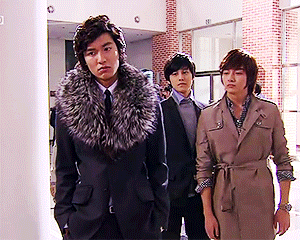
This is a toxic lesson most American girls learn very young. It is utterly untrue and teaches us all the wrong things about trusting dickbags and UGH. But that’s another day.
What I’ve learned from K-Dramas is that the meaner he is, the colder he is, the deeper his affection for the girl. For instance, the boys of F4 are bullies who rule their elite school (due to their richness and hotness and talent). The leader, curly-haired Goo Joon Pyo, is a real piece of shit to Geum Jan Di (at first). She endures no end of jokes about her hair, her clothes, her poor upbringing. She is even tarred and feathered (okay, egg & floured) and it is an ugly situation.
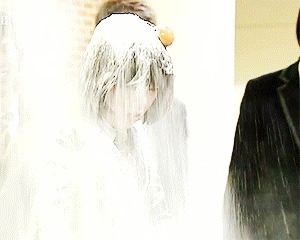
Yet it turns out that Joon Pyo is head-over-heels in L-O-V-E with Jan Di. Like, sickeningly so. Adorable as fuck, mind you, but super-intense-beyond-all-reason.
In the end, Jan Di teaches Joon Pyo the value of a simple life. Joon Pyo teaches her how to be both romantic as hell and a totally possessive jackass, and even though certain parts of my feminist nature rebel at some of the tropes and characterizations – I totally loved “Boys Over Flowers” and would 100% recommend it.
It is a super-common trope in K-Dramas.
No really. Just counting the ones I’ve personally seen: five. Five shows in which “gender bending” is a major (or minor) story point. Seven shows in which a pretty girl chops off her hair, binds her chest, tries to lower her voice and change her inflection, and goes undercover as a dude.
All with varying degrees of success.
Go Mi-Nam/Mi-Nyu in “You Are Beautiful”, played by Park Shin-Hye, was endearingly awkward to watch. Megan Lai in “Bromance” is the the strangest story for girl-masquerading-as-boy I’ve seen – but I admit I’ve only seen a bit of that series so far. “Nail Shop Paris” had one of the strangest set-ups I’ve come across, even though she got found out rather quickly by at least one of the fellas and “Coffee Prince” is one of the most beloved K-Dramas ever (according to the interwebs), despite the ploy.
I find it fascinating that I’ve not come across any boys pretending to be girls. That’s a lot more common in Western entertainment, though usually its tremendously transphobic/misogynstic and played for crude laughs.
Anyway, I choose to look at this trope in a more positive, uplifting light. The lesson to be learned here is simple: Love is Love. It doesn’t matter if they’re male, female, trans, cis, or any other point on the spectrum. When you’re falling in love and it is destiny… go with the flow.
Apparently hot, young, rich CEO-types have nothing better to do in Seoul, than to show up and rescue adorkable girls from their ho-hum poverty-stricken lives, or if they can’t immediately save them from that life, they can at least stalk them mercilessly until the capitulate.
Okay, okay… I’m taking it to a little bit of an extreme here, but another super common theme is that opposites attract. One is rich, highly educated, talented, ambitious (and exclusively male, from what I’ve seen). The other is poor, family-focused, talented in a limited/specific way.
In “Playful Kiss” (the Korean version may also be called “Mischievous Kiss”…), Oh Ha Ni’s life as the daughter of a noodle chef is not glamorous. But she’s got friends who share her position at the bottom of the class. Then their new home is destroyed by an act of nature and they’re forced to move in with her father’s old school friend, a wealthy man who’s son, Seung Jo, hits all the criteria for the savior trope. He is ridiculously smart, talented, athletic, handsome. He’s also kind of a d-bag… until the love of a simple woman transforms him… It is sweeter than I’ve implied, and this series was one of my favorites because it included a “wedding night” (i.e. someone actually HAD SEX!!!) which is omitted from so many K-Dramas.
In “Boys Over Flowers” Goo Joon Pyo is the wealthy jerkwagon who discovers street food, familial interactions & warmth, sleeping on the floor, and the joys of ramen when he falls for a poor, simple girl (our Jan Di).
In “Love Rain”, my beloved Jang Keun Suk plays “Joon”, a successful, in-demand young fashion photographer (who comes from money, naturally) with a heart that cannot be touched by love… until he encounters the adorkable gardener who dresses like a kindergarten student and has an indomitable, stubborn streak that will not allow his entitled assholery to ruin her day.
I wish the trope was reversed, occasionally. Subverted with a rich bitch falling for street urchin who teaches her all that she’s missing in her Ivory Tower (i.e. Disney’s Aladdin). Or better yet, let’s turn it on its ear with a pair of dudes or a pair of chicks. Add-in some flexible sexuality and we’ve got ourselves an edgy, modern K-Drama that I’d pay to watch!
Also possessiveness.
Passive-aggressiveness.
Random streaks of BURNING COLD SHOULDER for no apparent reason (or really flimsy ones).
Jumping to conclusions (erroneous ones).
…it is toxic, but that’s how things work in K-Dramas.
No matter how big the city, or how crowded the park, or how secluded the deserted beach you’ve run away to hide upon… you WILL run into your crush/ex/cheating lover there (usually at the WORST most inopportune time).
Now, despite the fact that Murphy’s Law sort of makes us expect this sort of thing in real life – it is really a logical fallacy and a total plot contrivance in K-Dramas.
For instance, Seoul is a city of 10 million people. It covers 376 square miles of land. It is FUCKING HUGE.
The chances of randomly bumping into the same six people involved in any given K-Drama romance/love-triangle is teensy. Even within ONE of the twenty-five districts… it is not likely that you’ll be holding hands with your sweetie while his mother happens to be walking by from one direction while your main rival spies on you from the other direction. Yet in K-Drama land… all. the. freaking. time.
They feel things. They hurt. And when the emotional pain cuts the deepest, tears will fall.
And somehow, it is sexy.
*ahem*
I digress.
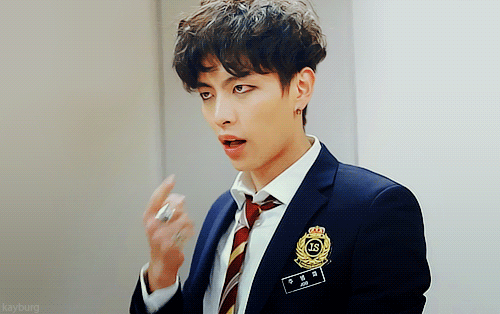
What other traditionally feminine things to the males in K-Drama relationships do? They were eye-liner. A lot of it, at times, and well (better than me, anyway). They carry shoulder bags (sure… they’re not purses, but some of the most fashionable ones look like it). They cross their legs at the knee. They wear pink (and salmon, and lavender) and bold prints. They were lots of accessories (scarves, jewelry, shoes).
And they are no less masculine for it. *gasp*
It is perfectly okay to pair a deep V with white skinny jeans, a scarlet trench coat, six rings, four bracelets, and more hair product than- Okay, okay – now I’m just riffing on my beloved JKS’ wardrobes and defeating my own point.
I’m sorry, it must be stated. Whoever dresses Jang Keun Suk must really hate him. He seriously has the worst wardrobe choices I have ever seen. Every other guy on the screen will be in slacks and a button-down but JKS will sweep in wearing high-water (almost capri-length) flares with boat shoes and no socks, a shirt that I’m fairly certain came from the tween-girl’s rack at JC Penny’s, a bedazzled scarf around his neck, and exquisitely coiffed hair.
Now that I’ve said that aloud, it will somehow reach his ears and he’ll never let me become captain of his Old Lady Brigade Fan Club. Damn it.
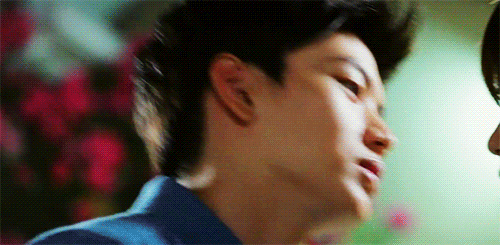
Yeah, I expressed my fondness for the honeymoon night in “Playful Kiss”, particularly because so many K-Drama romances are utterly sexless. Even their kisses are so polite and tongueless (over all… the first kiss for Joon & Ha Na in “Love Rain” was adorably bite-y and hot). Yet somehow, these characters always convey such a sense of intimacy with each other.
…and no one has to go full frontal.
They embrace. There is a full-body closeness there, even fully-clothed, that illustrates a depth of feeling far beyond the typical Hollywood hook-up.
They kiss on the forehead, which apparently is an indication of sincerity. I just know that when my husband kisses my forehead, I feel so safe and protected and loved and special…
They hold hands. They make long eye-contact. They talk. They communicate.
…and then, when the credits roll, they get to the serious porn-tastic boning. *ahem* In my headcanon, at least. Haha!
There are a LOT of issues with consent in the western world. Yet somehow, in the K-Drama land, consent seems to be at once MORE and LESS important.
A guy will grab the girl’s arm. He may drag her away from the situation. He may steal an unsuspecting kiss or the ever-popular back-hug. He may refuse to let go or stop when asked.
And in K-Drama land, these things are all both romantic and acceptable.
In the real world, I’ve seen boys get decked and/or suspended for unwanted touching a lot more gentle than the yank/grab/pull/physically restrain or block into a room stuff you see in K-Dramas.
Yet frequently, the guy will ask before he even hugs her or tries to hold her hand. He will ask her if she likes him before pursuing anything else. If she doesn’t, game over (unless they’re the end-game of the series, then all bets are off).
I think it is pretty craptastic to teach girls that behavior like that is romantic or sweet or cool. Yet, here I sit… an increasingly big fan of K-Dramas, many of which are INCREDIBLY problematic.
A lot to learn, a lot to ponder. Don’t you think? There are definitely some positive lessons to be gleaned – but upon reflection, it seems like a lot of them were a little squicky for my tastes.
Still… I will keep watching. Hey! I’m a grown-up who can form her own opinions and reactions to what I see. It is the young girls of the world I worry about, who don’t yet understand all the things that are wrong with our world.
Bah! That’s a depressing way to end up this silly list. I know! One more lesson I picked up from K-Dramas. A bonsu! Just for you.
BONUS: One last lesson from the world of K-Dramas. All Mothers are scheming, evil, vindictive c*nts with weird issues about their sons falling in love. All fathers are utter fuck-ups (even the successful, powerful ones) in their personal relationships. Family is always awful, unless you’re poor and close-knit, and somehow, despite all the drama and threats of disinheritance or even violence, no one ever gets exiled, jailed, or killed.
…which I guess is a good thing.
Theoretically.

Note: Image is “10 Things I’ve Learned” by Josie
GIFs located on Tumblr and are not owned or created by me.

3 comments for “10 Things I’ve Learned…”